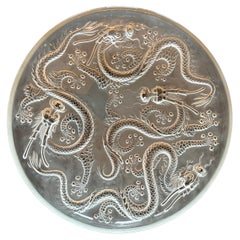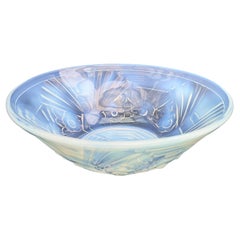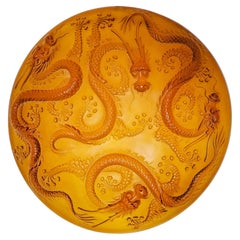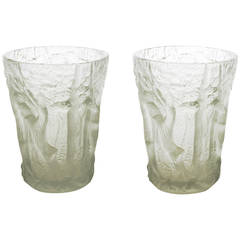Josef Inwald Glass
In 1902, Josef Inwald was given aristocratic status and the glassworks were granted special privileges including the right to use the emblem of Austrian eagle. The owner has invested in other glassworks in the Bohemian area and he transferred his firm to Prague, the capital of the young Czechoslovak republic, in 1922. After he died in 1925, his second son, Oskar, took over the company. Under his management, probably the most important decision was made for the future of the glassworks in 1927, the enterprise started to produce lead crystal glass. There was a significant increase in demands and that brought development and in effect, renewal of all premises. The Depression of the 1930s put an end to Inwald's concern. The glassworks in Podebrady was bought by Česká eskomptní Banka from Karlovy Vary, the factory was to be leveled and plots sold off to build family houses. Luckily, this was called off due to the cost of the project. New director Leo Moser saved the factory and renewed its former fame for a short time. The firm stopped growing when he left Czechoslovakia due to imminent occupation.
1930s Czech Art Deco Vintage Josef Inwald Glass
Art Glass
Mid-20th Century English Art Deco Josef Inwald Glass
Glass
1930s Czech Art Deco Vintage Josef Inwald Glass
Art Glass
1920s Swedish Art Deco Vintage Josef Inwald Glass
Glass
Early 20th Century French Art Deco Josef Inwald Glass
Crystal
Mid-20th Century Czech Mid-Century Modern Josef Inwald Glass
Blown Glass
Mid-20th Century Italian Mid-Century Modern Josef Inwald Glass
Murano Glass
1950s Czech Mid-Century Modern Vintage Josef Inwald Glass
Art Glass
1930s Czech Art Deco Vintage Josef Inwald Glass
Art Glass
1920s French Art Deco Vintage Josef Inwald Glass
Glass
1930s Czech Art Deco Vintage Josef Inwald Glass
Glass, Art Glass, Opaline Glass
Late 20th Century Scandinavian Josef Inwald Glass
Glass, Art Glass
1930s Czech Art Deco Vintage Josef Inwald Glass
Glass, Art Glass
Early 20th Century Czech Josef Inwald Glass
Glass



